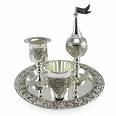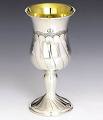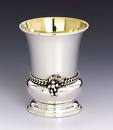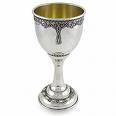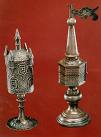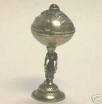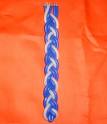Some say or sing the following Psalm before the Grace After Meals.
A Song to be sung while ascending the steps of the Holy Temple.
When Hashem will return the exiles to Zion,
it will seem to us as if we have been dreaming.
Then our mouths will be filled with laughter,
and our tongues with happy songs.
Then the nations will say:
"Hashem has done great things for them."
Even while we are still in exile, we rejoice,
because we know that Hashem does great things for us even now.
Hashem! Return our exiles, let them flow to the land of Israel,
bringing salvation like streams of water
would bring salvation to a desert.
We who perform the Commandments of the Torah in exile
often worry about our future;
but when the Redemption comes we will reap the reward
for our work with happy songs.
When a person plants,
he might worry that the crop will not be successful,
but when he finishes the harvest,
and he walks away carrying the harvested sheaves,
he returns home singing happily.
That is how we, the Children of Israel,
shall be brought out of exile into Redemption.
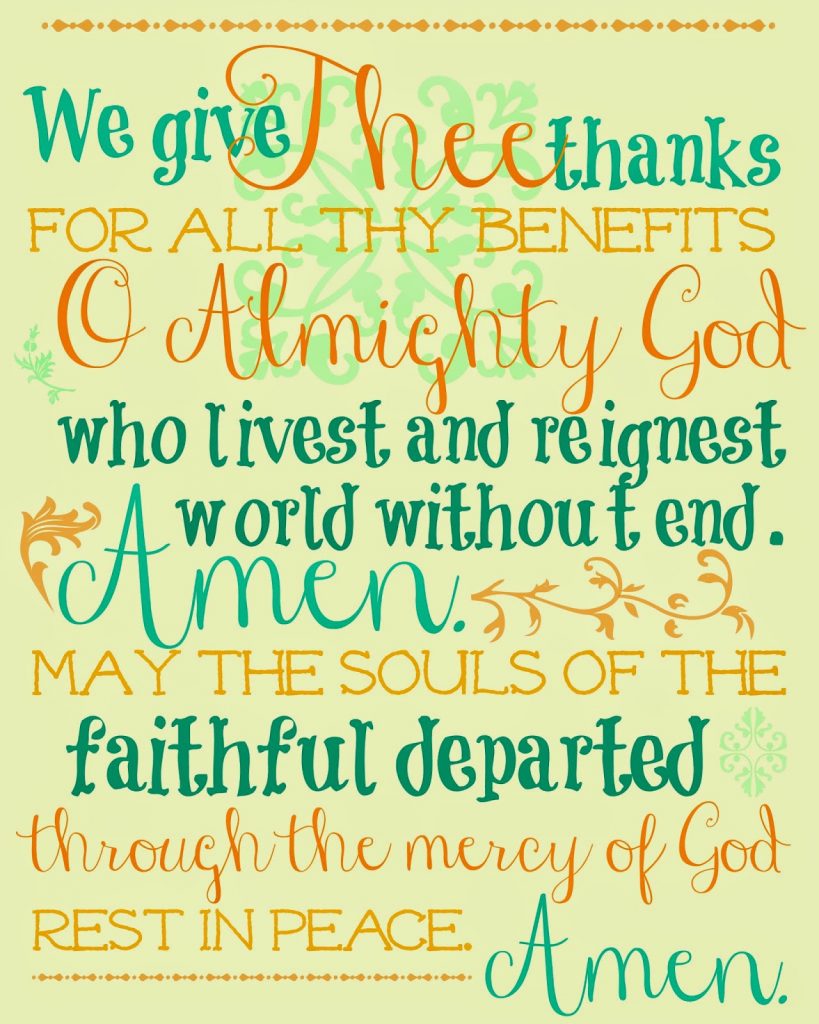 Wash as much of your hands as have been dirtied by food, or at least the tips of your fingers. It is customary to remove the dish of dirty water from the table before reciting any blessings.
Wash as much of your hands as have been dirtied by food, or at least the tips of your fingers. It is customary to remove the dish of dirty water from the table before reciting any blessings.
All recite:
I am hereby prepared and ready to fulfill the Commandment of saying the Grace After the Meals.
When the Grace after Meals is said with a mezuman (a quorum of three or more males over the age of 13), Zimun is recited, in which the Leader (which need not be the same Leader as the rest of the Seder) invites the others to participate in the Grace After Meals. (If there is a minyan (a quorum of ten or more males) participating, the words in the parentheses are also recited.) If there is neither a mezuman or minyan, begin at the First Blessing
It is forbidden to speak from the beginning of zimun until after the end of the Grace After Meals.
Zimun: Invitation
Leader: Gentlemen, let us say Grace!
Others: May Hashem’s Name be blessed from now and forever.
Leader: May Hashem’s Name be blessed from now and forever.
With the permission of the distinguished people present,
let us bless (our God,) He whose bounty we have eaten.
Others: Blessed is (our God,) He whose bounty we have eaten, and through Whose goodness we live.
Leader: Blessed is (our God,) He whose bounty we have eaten, and through Whose goodness we live.
All: Amen. Blessed is He and blessed is His Name.
First Blessing: For the Nourishment
Blessed are You, Hashem, our God, King of the universe, who, in His goodness, nourishes the whole world with grace, with kindness and with mercy. He gives food to all flesh, for His kindness lasts forever. Through His great goodness to us continuously we do not lack nourishment, and may we never lack it, for the sake of His great Name. For He is God Who nourishes and sustains all, does good to all, and prepares food for all His creatures whom He has created, as it is said: You open Your hand and satisfy the desire of every living thing. Blessed are You, Hashem, who provides food for all.
Second Blessing: For the Land
We thank You, Hashem, our God, for having given as a heritage to our fathers a precious, good and spacious land; for having brought us out, Hashem our God, from the land of Egypt and for having rescued us from the house of slavery; for Your covenant which You have sealed in our flesh; for Your Torah which You have taught us; for Your statutes which You have made known to us; for the life, benefit, and kindness which You have graciously bestowed upon us; and for the food we eat with which You feed and sustain us constantly: every day, every season, and every hour.
For everything, Hashem, our God, we thank You and bless You. May Your Name be blessed by the mouth of every living being, constantly, forever. As it is written: When you have eaten and are satisfied, you shall bless Hashem, your God, for the good land which He has given you. Blessed are You, Hashem, for the land and for the nourishment.
Third Blessing: For Jerusalem
Have mercy, Hashem our God, upon Israel Your people; on Jerusalem, Your city; on Zion, the home of Your Glory; on the monarchy of the family of King David Your anointed; and on the great and holy House which is called by Your Name. Our God, our Father—tend us, nourish us, sustain us, support us, relieve us; Hashem our God, grant us speedy relief from all our troubles. Hashem, our God, please do not make us dependent on gifts from human hands, nor on their loans, but only upon Your full, open, holy and generous hand, that we not feel inner shame nor be humiliated before others, forever and ever.
(On the Sabbath say: May it please You, Hashem, our God, to give us rest through Your
commandments, and through the commandment of the Seventh Day, this great and holy Shabbos.
For this day is great and holy before You, for abstaining from work and for resting on this day, with love, in accordance with the commandment of Your will. And willingly, Hashem, our God, please grant us rest so that there be no trouble, worry, sadness or grief on the day of our rest. Hashem, our God, let us see the consolation of Your city Zion, and the rebuilding of Jerusalem Your holy city, for You are the Master of salvations and the Master of consolations.)
(On a Holiday or Rosh Chodesh say: Our God and God of our fathers, may the remembrance and consideration of us, of our fathers, of the Messiah from the family of David Your servant, of Jerusalem Your holy city, and of all Your people the Family of Israel, ascend, come and be experienced, be seen and accepted, heard, considered and remembered before You, for deliverance, well-being, grace, kindness, mercy, good life and peace, on this day of
| (Rosh Chodesh) |
(the Festival of Matzos) |
(the Festival of Shavuos) |
| (the Festival of Succos) |
(the Shemini Atzeres Festival) |
(Remembrance) |
Remember us this day, Hashem, our God, for goodness; consider us this day for blessing; help us this day for a good life. With a word of salvation and compassion, spare us and favor us; have mercy on us and deliver us; for we look to You, for You are a gracious and merciful God.
Rebuild Jerusalem the holy city soon in our days. Blessed are You, Hashem, Who in His mercy rebuilds Jerusalem. Amen.
Fourth Blessing: Hashem’s Goodness
Blessed are You, Hashem, our God, King of the universe, Mighty God, our Father, our King, our Might, our Creator, our Rescuer, our Maker, our Holy One, Holy One of Jacob, our Shepherd, the Shepherd of Israel, the King Who is good and does good to all. Who, each and every day, has done good for us, does good for us, and will do good for us; He has bestowed, He bestows, and He will forever bestow upon us grace, kindness and mercy, relief, rescue and success, blessing and salvation, consolation, sustenance and nourishment, compassion, life, peace and everything good; and may He never cause us to lack any good.
Various Requests
May the Merciful One reign over us forever and ever.
May the Merciful One be blessed by everyone in heaven and on earth.
May the Merciful One be praised for all generations, and be glorified in us forever and for all eternity, and be honored in us forever and ever
May the Merciful One grant us an honorable livelihood.
May the Merciful One break the yoke of exile from our neck and may He lead us upright to our land.
May the Merciful One send abundant blessing into this house and upon this table at which we have eaten.
May the Merciful One send us Elijah the Prophet of blessed memory, and may he bring us the good news of the imminent arrival of the Messiah, salvations, and consolations.
Blessing the Host and Hostess of the Home
May the Merciful One bless:
(Those eating at another’s table: (my father, my teacher,) the master of this house, and (my mother, my teacher,) the mistress of this house; them, their household, their children, and all that is theirs;)
me, (my wife / husband and my children) and all that is mine; us, and all that is ours—just as our forefathers, Abraham, Isaac and Jacob were blessed, in everything, from everything, and with everything—so may He bless all of us together, with a perfect blessing, and let us say: Amen.
May Heaven find merit (in them and) in us so that we may enjoy a lasting peace. May we receive blessing from Hashem, and justice from the God of our salvation, and may we find favor and good understanding in the eyes of God and man.
(On the Sabbath add: May the Merciful One grant us the day which will be all Shabbos and rest for all eternity.)
(On Rosh Chodesh add: May the Merciful One grant us this new month for goodness and blessing.)
(On a Jewish Holiday add: May the Merciful One grant us the day which is completely good.)
(On Succos say the previous, and add: May the Merciful One erect for us the fallen Succah-protection of king David. May the Merciful One grant us the merit to sit in the Succah-protection that He will make from the skin of the Leviathan in the World To Come. May the Merciful One spread over us His complete Succah-protection.)
(On the first two nights of Passover add: May the Merciful One grant us the day which is completely good, that everlasting day, the day when the righteous will sit with crowns on their heads, enjoying the Glory of the Divine — and may our portion be with them!)
(On Rosh Hashanah add: May the Merciful One grant us this new year for goodness and blessing.)
On all days, continue:
May the Merciful One grant us the privilege of seeing—and living in—the Messianic Era and the life of the World to Come. He is a tower of salvation to His king, and bestows kindness upon His anointed, to David and his descendants forever. He who makes peace in His high places, may He make peace for us and for all Israel; and now say: Amen.
Fear Hashem, you—His holy ones—for those who fear Him experience no lack. Even the strong and the rich feel want and hunger, but those who seek Hashem shall not lack any good. Give thanks to Hashem for He is good, His kindness is everlasting. You open Your hand and satisfy the desire of every living thing. Blessed is the man who trusts in Hashem, for then Hashem will be his security. I have been young, and I have aged, and I have not seen a righteous man forsaken, with his children begging for bread. Hashem will give might to His people; Hashem will bless His people with peace.
